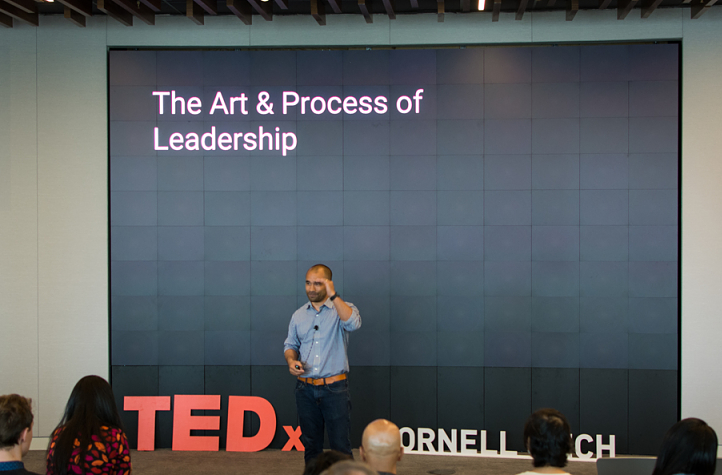I was asked to give a talk at TEDx Cornell Tech. This was the inaugural event and it was exciting to be a part of it. There were lots of very interesting and successful speakers invited to the event. I happened to be the only student of Cornell Tech invited to speak and this made me very nervous. Although I always have thoughts rolling around in my head, I didn’t know exactly what the audience was going to be most excited by. I remember hearing Simon Sinek once say that he only talks about things he knows about, and that makes speaking easy. So I decided to talk about my personal struggle with understanding what leadership was and what I now believe it means to be a good leader. Of course, my military background played a large part in my understanding of leadership, but I decided to not make this whole talk about me, but about other people that I respected. I went around and interviewed friends and colleagues and honed in on the stories I felt were most compelling and the common threads between everyone’s stories. I was surprised at how emotional these stories got. I was close to shedding a tear on multiple occasions just listening to the amount of respect these people had towards their leaders or how impactful it was for them to be a caring leader.
I am exposing my vulnerabilities by posting this video here. I hate watching it because I see how nervous I was and how that translated into how I talked, walked and gestured. But I believe that life is about putting yourself out there. “Some people fail to grow and some people fail in order to grow.”
I’ve discovered that if you dedicate most of your time to this one attribute, you’ll become a leader that is remembered far longer than your time as their leader. You just need to sincerely do one thing: To Care. That’s it! You just need to truly care about others.
Here is the transcript to the talk:
“Nine years ago, I walked nervously down the stairs of an old German fire station through a cold steel door to meet a small team of eight US soldiers for the first time. I was a fresh college graduate and a new officer in the United States Army. I had a lot of training but not so much practical application. And I was supposed to be in charge. As they turned to face me I could see their eyes first look at my rank and then analyze me from top to bottom. I looked skinny, young and not intimidating. So what do I do? How do you get people that are much more experienced than you to listen and respect you? I can tell you, looking back, I’m embarrassed by the approach I took.
I graduated from the US Military Academy at West Point. This is an academy that breeds leaders like Eisenhower and MacArthur. My two brothers attended there and my father had a long, respected career in the Army. I was primed to lead in the military. But deep down inside, I was scared of leadership. My charisma level was questionable, my competency level was just a little above average. And with the war in Afghanistan on my horizon, I had to ask myself if I was ready to be responsible for people’s lives. What I left West Point with, was an understanding of the science of leadership. In my mind, there was a long checklist of do’s and don’t’s that would ensure my success as a leader and these are things passed down from one great leader to the next. So I graduated, and I took off with my memorized lines and procedures, which were bound to make me an awesome leader.
So there I was in front of my team spouting memorized lines and trying to follow the leadership equation to a “T”. I could actually see them feeling my awkwardness. I wasn’t being myself. I felt like a robot. So here’s my first point, leadership is not something that takes memorization. A checklist alone won’t guarantee your leadership success. People see right through this. Maybe they’ll appreciate your effort but it is definitely not natural and it becomes hard for you to keep up that facade.
Throughout my years in the military and after listening to stories from dozens of other successful military leaders and their subordinates, I’ve found one common attribute to always be present. And that’s what I’m sharing with you today. I’ve discovered that if you dedicate most of your time to this one attribute, you’ll become a leader that is remembered far longer than your time as their leader. You just need to sincerely do one thing: To Care. That’s it! You just need to truly care about others. Now that may seem very soft and non concrete, especially coming from a military guy. I could slam my fist while saying it if it makes it sound tougher, but seriously, it’s this touchy/feely concept of caring that always wins in leadership. It is the number one attribute that you wished your leaders had when you were coming through the ranks. Yet, somehow, when we become leaders, we forget how much we used to want someone to care about us. The reason we all want a leader that cares about us is because we have basic needs to learn, grow, achieve recognition, and be accepted; and caring leaders validate those needs.
I’ll share with you three of my favorite examples today of Caring Leadership in Action:
1) I Need You
In my interviews with leaders, I found a magic phrase: “I need you”. How many times have you said that? I have a 2 year old and he says that to me sometimes and I stop in my tracks and I pick him up and give him the biggest hug and don’t let him go for awhile. I believe that inherently, when someone tells us that they need us, it changes our mindset, we open up to them. If they are genuine about it, we want to help them. What if you said that as a leader? We tend to think that these words expose a vulnerability, and we shy away from using them in the workplace. Why? The strongest team bonds come together from this type of mindset of one person needing another.
I interviewed an Army pilot that used the phrase “I need you” with powerful results. He used these three words to forfeit some of his own pride in exchange for someone’s dedication to the mission. He told me how he was put in charge of twenty plus soldiers who were about to head to Iraq. Most of the soldiers including himself had never been to Iraq or any war zone for that matter. He had two well seasoned sergeants on his team that had been to Iraq a couple times. In the Army we call these type of guys salty. As this pilot worked to prepare his soldiers for war, he watched as the 2 sergeants mockingly observed without providing support. He grew more and more frustrated as the 2 people with the most experience chose not to help and acted as if all the training was beneath them. After weeks of frustration, he walked over to the 2 salty soldiers and asked them to step outside with him. It was then that he put his hands on their shoulders and looked in their eyes and said “I need you.”
There was an immediate change in their eyes. A look of shock at first. He empathized with them about how repetitious and invaluable this may seem to them because they were much more experienced and then explained the value he saw in them to the team. You could see a look of determination and professionalism come over them. There was a mental shift and the time for selfishness was gone. It was time to get ready for war! They changed their attitude from that point forward and upon bringing everyone home safe from war, they each wrote that pilot a long letter explaining how touched they were by someone that saw their value and personally cared for them. He was the best leader they ever had.
That one phrase can be so powerful. Why? Because this pilot cared about his entire team. He was willing to open up to the salty soldiers and invite them into the mission of the team. He did not want his team to be a conglomeration of single individuals, each doing their own thing. He wanted his team to be more like a single individual doing a lot of things at once, and he needed everyone on board to do that.
Remember that magic phrase “I need you”
2) Challenge your team members so that they thrive
A second story will help you see why you should care to understand your team members and challenge them individually. Jack Welch, former CEO of General Electric, once said “Before you are a leader, success is all about growing yourself. When you become a leader, success is all about growing others.” I know a veteran who was once the only female officer in her army unit. As a petite 5 foot tall woman, such a masculine alpha-male environment could be quite intimidating. This vet told me story after story about the boss she had there that challenged her to the point of exhaustion. And she loved it. Her boss was 6 foot 4 with a booming voice and people listened when he spoke. Instead of coddling her and sheltering her from the hard-charging men around her, her boss challenged her to excel at her job.
He took the time to understand her and her strengths and made sure that whenever opportunities arose, he would challenge her to use her skills. She remembered some of her first company meetings when the boss was presented with difficult decisions to make. Instead of spouting off an answer which the boss was likely capable of doing, he directed everyone’s attention to the lady in the back of the conference room and asked her for her advice because the decision involved her area of expertise. These public displays of trust in her capabilities made her feel totally comfortable and involved. She felt proud of her contributions and this led her to thrive in her environment.
A caring leader looks for potential in the people he leads and when you discover this potential, call it out! Truth is your team wants to be challenged and motivated. They love to have tasks that make their minds come alive and stimulate new ideas. As a leader, you can promote intrinsic motivation by giving your team opportunities to self-express and show off their strengths.
3) Give more than you take
As a last point i want to encourage you to change your paradigm from a taking mentality to a giving mentality. Most people start a new job by thinking “I’m going to learn so much from this new job” or “When I leave this job I’ll be able to add to my resume that I was a manager”. And when they leave, they pack everything up and take off leaving very little behind. But what if you started your job with “I’m going to give” statements? Like “I’m going to give my best to help my team perform better”. “I’m going to give helpful career advice to people that work for me”. You see, that paradigm change of giving versus taking suddenly changes the type of leader you are trying to be.
A friend of mine served as a Lieutenant in the Israeli Army and he told me about a time he chose a giving mindset. When he was a young leader he had a boss that he wished he could be mentored by, but that boss was not at all approachable. My friend took this as a lesson in what he didn’t want to be. He wanted to be a giving leader and decided one day that he was going to start holding what he called “dream sessions” with his team. He had a diverse team, both young and old, military and civilian members. He started with the youngest soldier first and went outside in the fresh open air. Under the warm sun with some french fries sitting on the table, he asked this young man what he wanted to get out of his time as part of this team. The soldier told him he wanted a college degree and he felt concerned about taking care of his family. My friend gave him the advice that he could and told him he’d link him up with people that had already taken that journey. My friend was amazed at how much this young man had been thinking about his future and how excited he was to share it. He then continued meeting with a new soldier each week. Soon the older civilian team members who were twice his age were asking for a dream session with him. Word spread like wildfire and his peers who were leading other teams started asking him how he was conducting these dream sessions. My friend said that his team became incredibly high performing after he started the dream sessions due to two main reasons: First. His team members felt appreciated and felt as if they were being personally welcomed to the team. And second. He was now able to distribute tasks and instruct without awkwardness. Have you ever asked someone to do something that you barely knew? It’s tough because it feels very one way and shallow. For my friend, he told me that he felt much more in tune with what makes his people tick and was able to frame his leadership in a much more personal way. This is what happens when you choose a giving mentality instead of a taking mentality. Keep in mind of how you can give to your team as a leader. Not just take.
Closing
In closing, as I have made this transition out of the military world, and into the civilian workforce, I have found that people are the same, whether soldiers or software developers. They want to know you care. And when you truly care, you “give” much more than you take. You give time to understand people and challenge them to reach their potential. You should make frequent efforts to remind people of their importance and how much they are needed.
So this is what you can do on Monday when you show up to work. You don’t have to be the designated leader to do this. Find someone on your team that you don’t know much about and start a dream session. What does he or she really want in their future and how can you “give” to help make it happen?
I would like to end with this: “Leadership in the end is an affair of the heart. When we care and invest our time in people, we receive dividends for a lifetime”. This is what I NOW believe is leadership.
Thank you.”







Mr. Falou,
Thank you for your service. I am currently a Pilot stationed at Fort Polk, and found your article about the GI Bill and using it while on terminal leave. I will be retiring next year and also habe similar aspirations with attending business school in NYC and eventually starting my own company. Id definetaly like to pick your brain as you are 3-4 years ahead of me and coming from a simliar background.
Tim– I’m glad to hear that. Let me know how I can help. Do you know what kind of business you are interested in? That could help in deciding what school to go to. I have a personal preference for the one year schools because it meant that I could get to work on my start-up faster. Got the degree and got out quickly. Hit me up via email at ian@themilitaryentrepreneur.com.